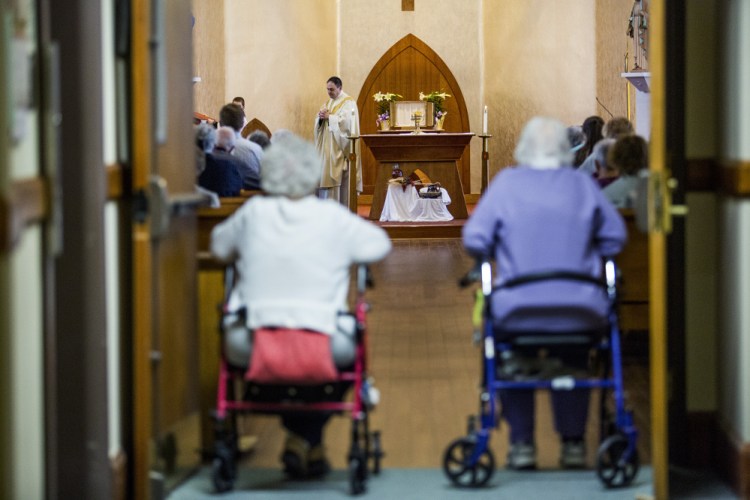The Rev. Paul Dumais learned how to be a good neighbor when he was growing up in Madawaska, a town where strangers greet each other on the sidewalk and people bring casseroles to births and to funerals, the bookmarks of life.
When he attended St. John’s in Boston, the other seminarians used to tease him because he was always talking to strangers on the street and inviting them in for evening prayer and supper.
Dumais, the recipient of the Source Good Neighbor award, believes the notions of neighborliness and sustainability go hand in hand, on a practical level and a spiritual one.

The Rev. Paul Dumais says Mass (above) and the washes the feet of worshippers (below) on Holy Thursday at the d’Youville Pavillion at St. Mary’s Hospital in Lewiston.
“Think about the neighborliness that sometimes occurs in farming communities,” he said. “There’s an understanding that sometimes your neighbor needs help, or needs to borrow a tool or needs an extra set of hands. That kind of neighborliness, it defines farming communities in a special way. There’s an opportunity for those of us who have moved into the suburbs to reflect on that. Sometimes in the suburbs and in the city, we’re closer to people but we’re more estranged.”
Dumais, 44, is a priest in the Prince of Peace Parish in Lewiston, a hospital chaplain at St. Mary’s Regional Medical Center, and a campus chaplain at Bates College. He has also served as a prison chaplain, and he rides around in an apple green VW bus he is restoring himself. To Mainers who care about where their food comes from, he is perhaps best known for his organic food advocacy, love of bread baking and sharing of the agrarian tales he tells of the Saint John Valley. Marada Cook, co-director of the Crown O’ Maine Organic Cooperative, said in her nomination that “Father Paul plants seeds of land-based knowledge and hope wherever he goes, whether his listeners are Catholic or not.”
Dumais bakes bread for parish events and for the priests he lives with, sourdough buckwheat loaves with walnuts, anadama, and “Madawaska bread,” the last made with buckwheat flour and roasted potatoes. He says it’s “nice to be able to give something to others that’s so simple and so appreciated.” Dumais is also a work-share member of the CSA at Little Ridge Farm, a certified organic farm in Lisbon that once a month gets deliveries of his rustic French batard or naturally leavened boule.
Food sustains us physically, and the sharing of it sustains us spiritually and makes for good neighbors, Dumais says. On a practical level, that can mean doing something as simple as baking a plate of cookies for the family who just moved in down the street. (Dumais once helped develop a network of volunteers in Waterville who were willing to bring meals to families with new babies at home.) One of the corporal works of mercy in the Catholic tradition is the feeding of the hungry, Dumais said, a task that benefits the giver as much as the receiver.
“Sometimes I like to think of charity ultimately as the love of God moving through us, more like a river than a pond that becomes stagnant if there’s no outlet,” Dumais said.

Rev. Paul Dumais meets with Mass attendees in the sacristy of the chapel at the d’Youville Pavillion at St. Mary’s Hospital in Lewiston.
But Dumais’ notion of neighborliness extends even farther, into wider, ever-expanding, interconnected concentric circles – into politics and protection of the world’s natural resources.
Dumais, for example, enjoys demonstrating how to make naturally leavened buckwheat pancakes known as ployes; it’s something he does to help reconnect French-Canadians to their culinary roots. But he also expands on this idea to give it a spiritual twist: This month, Dumais will make ployes at the St. Mary’s Nutrition Center alongside a Somali woman making a strikingly similar Ethiopian flatbread. Relations between residents and immigrants in the Lewiston-Auburn area have been tense; the idea is to focus on the two cultures’ similarities instead of their differences.
Conserving energy, protecting pure water and clean air, and purchasing sustainably grown food can also be acts of neighborliness, if the definition of neighbor is expanded to include people living few states over or halfway around the world.
“When we are attentive about how we use, protect, preserve and sustain (natural resources), there’s a very real sense in which we are being neighborly,” Dumais said. “We come to see ourselves as working together to steward.”
Send questions/comments to the editors.



